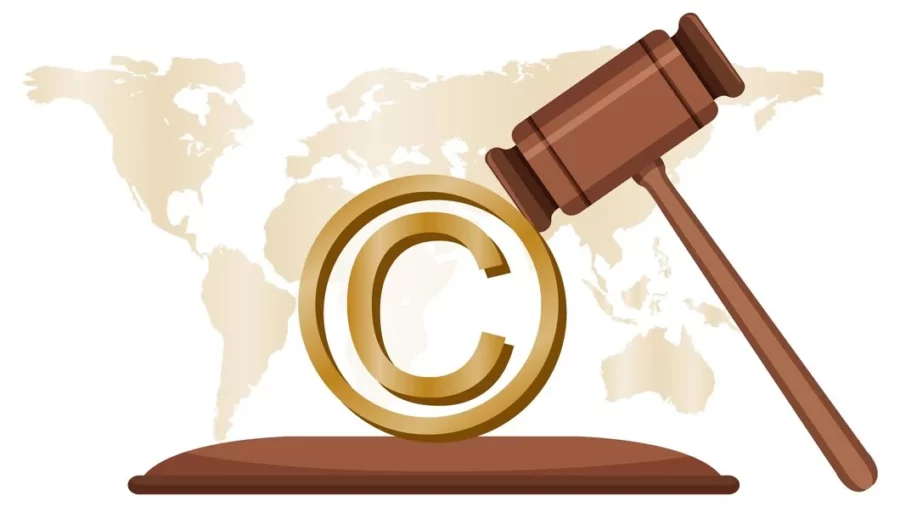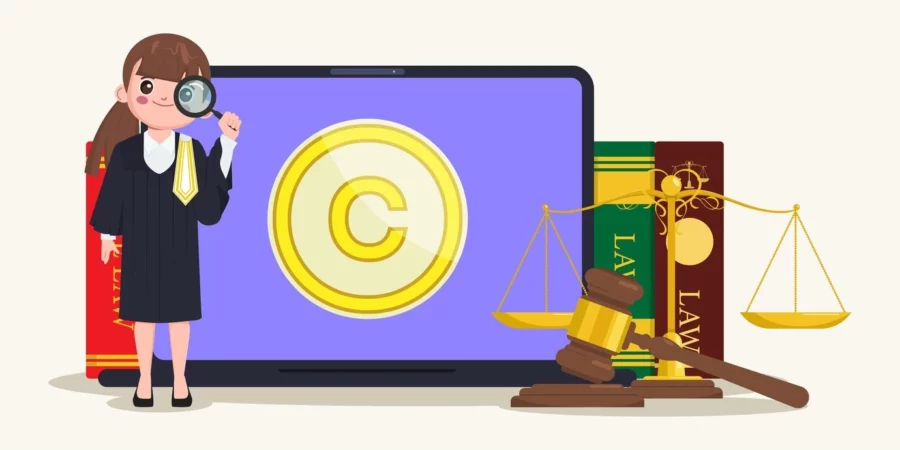Key Takeaways:
- Tattoo artists own the copyright to their original designs, and reproducing or copying a tattoo without permission can lead to legal consequences.
- While some argue that tattoos may fall under “fair use,” especially for personal, non-commercial purposes, the legal landscape remains unclear, particularly for designs used in media or commercial settings.
- To prevent copyright issues, both tattoo artists and clients should seek permission when using copyrighted images or designs in tattoos, ensuring respect for intellectual property rights.
Despite being around for centuries, tattoos have become much more popular a while ago.
They’re a form of self-expression, art, and sometimes even a fashion statement. What transpires, though, if someone else chooses to use your tattoo design without your consent? This is where the issue of tattoo copyright infringement arises.
Many people wrongly assume that the individual who gets a tattoo automatically possesses the copyright to the design. However, this is frequently not accurate.
In fact, the copyright usually belongs to the tattoo artist who created the design.
The artist’s exclusive rights are thus threatened if another party attempts to utilise the identical work without first getting permission from them.
Unfortunately, tattoo copyright infringement is becoming increasingly common.
From clothing companies to movie studios, many entities have used tattoo designs without the proper authorisation. This can result in legal battles, fines, and even reputational damage.
So, what can you do to protect your tattoo design and prevent copyright infringement?
The various facets of tattoo copyright law, such as ownership rights and infringement cases, will be discussed in this blog.
We’ll also look at actual instances of tattoo copyright violations and talk about the possible repercussions.
Whether you’re a tattoo artist, a tattoo bearer, or simply someone interested in the applicability of copyright law, this blog is for you.
Protect Your Brand & Recover Revenue With Bytescare's Brand Protection software
What is Copyright in a Tattoo?
To understand tattoo copyright infringement, it’s essential to first grasp the basics of copyright law. Copyright is a form of intellectual property law that protects original works of authorship, including literary, artistic, musical, and other creative works, such as paintings, sculptures, and even tattoos.
Copyright gives the creator of the work exclusive rights to reproduce, distribute, display, or create derivative works based on the original.
In the context of tattoos, copyright applies to the design created by the tattoo artist. Since tattoos are considered original works of art, they are protected under copyright law.
The artist who designs and applies the tattoo typically owns the copyright, meaning they have the exclusive rights to reproduce, distribute, and display the tattoo design. However, the recipient of the tattoo has the right to publicly display it as part of their body.
While the artist retains ownership of the design, they may use it in their portfolio or for promotional purposes, unless otherwise agreed upon. The recipient, on the other hand, may need permission to use the tattoo commercially, such as in advertisements or media, where reproduction of the design occurs.
The Protectability of Tattoos under Copyright Law

As a form of creative expression, tattoos are subject to copyright regulations.
This protection is extended to pictorial and graphic works that display originality and are fixed in a tangible medium.
The expression must be unique to the creator and exhibit at least a certain level of inventiveness in order to be protected by copyright.
Given that tattoos are permanently inked on the human body, which serves as the tangible medium of expression, they meet the criteria for copyright protection.
In the United States, the applicable statute emphasises the requirements of originality and fixation on a tangible medium of expression. Indian law, however, does not explicitly state the need for a tangible medium.
Despite this difference, the permanent nature of tattoos and the human body acting as the tangible medium of expression make it evident that tattoos qualify for copyright protection in both countries.
It is important to comprehend that copyright protection is only applicable to original artwork and custom-made tattoos, and does not cover generic designs commonly found in catalogs.
Originality is the primary factor in determining whether a work is eligible for legal protection.
If a tattoo artist holds the copyright for a particular design, they also have the right to exploit that copyrighted work.
In India, tattoos can be protected under the category of ‘artistic work’ as long as they satisfy the statutory conditions, such as being an ‘original work’ and ‘fixed in a tangible medium’.
Protect Your Brand & Recover Revenue With Bytescare's Brand Protection software
Types of Tattoo Designs That Can Be Copyrighted
Tattoo designs that can be copyrighted are those that meet specific criteria under copyright law.
These criteria include originality, creativity, and fixation in a tangible medium.
Here are some types of tattoo designs that can potentially be copyrighted:
- Custom tattoo: Unique, one-of-a-kind designs created specifically for a client by a tattoo artist are eligible for copyright protection.
- Artistic works: Tattoo designs that are considered artistic works, such as intricate illustrations, paintings, or drawings, can be copyrighted.
- Portraits: Realistic portraits of people or animals, when created with enough originality and creativity, can be copyrighted.
- Typography: Original typographic designs, such as stylised lettering or calligraphy, may qualify for copyright protection if they demonstrate sufficient creativity.
- Geometric patterns: Complex and unique geometric patterns or mandala designs can potentially be copyrighted if they are original and not derived from existing designs.
- Abstract designs: Original abstract designs that display creativity and are not based on pre-existing works can be copyrighted.
- Collaborative works: In some cases, a tattoo design may be a collaborative effort between multiple artists, and the resulting work can be copyrighted if it meets the necessary criteria.
It is important to note that copyright protection applies only to original and custom-made tattoos, and not to common or generic designs found in tattoo catalogs or widely available online.
A tattoo design must exhibit a minimal level of inventiveness and be unique to the artist to qualify for copyright protection.
Ownership of Copyright in Tattoos

The ownership of tattoos is a complex issue as it involves the artistic expression of both the tattoo artist and the person who bears the tattoo.
In India, according to Section 17 of the Copyright Act of 1957, the tattoo artist is considered the first owner of the copyright of the tattoo as it is classified as an artistic work under the Act.
This means that the tattoo artist has the right to control and regulate the tattoo bearer’s actions in relation to the tattoo design.
However, the person who owns the copyright has the right to make the artwork accessible to the public, in accordance with Section 14(c)(ii) of the aforementioned Act of 1957.
This implies that the tattoo artist is entitled to the rights of the artistic work only, and not the tattoo bearer’s body that has been inked with the tattoo.
This raises questions about the right to freedoms promised by Article 19 and Article 21 of the Indian Constitution.
The tattoo bearer may own the physical tattoo, but the copyrights of the designs may still rest with the tattoo artist.
This means that the tattoo artist can claim royalties for replication or reproduction of the actual design on other mediums.
Overall, the ownership of tattoos involves a balance between the artistic expression of the tattoo artist and the right to bodily autonomy of the tattoo bearer.
Protect Your Brand & Recover Revenue With Bytescare's Brand Protection software
What is Tattoo Copyright Infringement?
Tattoo copyright infringement occurs when a copyrighted tattoo design is used or reproduced without obtaining permission from the rightful owner, usually the tattoo artist. This infringement can take various forms, such as replicating a tattoo design without authorisation, or incorporating a copyrighted design, such as a well-known logo or artwork, into a tattoo without permission.
Another common scenario is when tattooed images are reproduced in commercial contexts, such as video games, advertisements, or merchandise, without compensating the original artist.
Using others’ copyrighted creative work in tattoos violates the exclusive rights of the creator, which include the ability to reproduce, distribute, or publicly display their work. The consequences of such infringement can be severe, potentially resulting in legal action, financial penalties, and even the removal of infringing content from commercial media.
Both tattoo artists and clients must know the laws surrounding tattoo copyright. For artists, it is essential to create original designs and protect their work through copyright. For clients, being aware of copyright issues helps avoid using protected images without permission.
A clear agreement between artist and client can help prevent potential legal disputes and ensure respect for creative ownership.
Who Owns the Copyright of a Tattoo: Exploring Ownership Options for Tattoo Bearers
The tattoo artist is the sole owner of the design, as was previously stated.
There are many ways for the individual or tattoo recipient on whose body the tattoo in question is drawn to acquire exclusive ownership rights in that tattoo.
Some of these methods include:
Independent Contractor Agreement for a Tattoo Artist
A contract between a tattoo artist and their customer that permits the tattoo artist to serve as an independent contractor for the client is known as a tattoo artist independent contractor agreement.
The services to be rendered, the parties’ financial responsibilities, and most intriguingly, who will own the intellectual property connected to the artistic creation, are all included in these agreements with artists.
Additionally, this kind of contract contains an ownership clause that specifies who owns the “work product,” which includes notes, sketches, models, moral rights, copyrights, and various other items.
In general, all rights, titles, and interests are acquired by the client for whom the entire work was completed over the term of the contract.
Assignment in accordance with Section 18 of the Act of 1957
In situations in which the contract indicating who owns the ownership rights to the tattoo has not yet been signed, the two parties may make and sign an assignment in accordance with the provisions of section 18 of the Act governing copyright.
This assignment must be done before the contract can specify who owns the ownership rights to the tattoo.
The assignment is only valid if it is signed by the assignor or a properly authorised agent, it should be stated.
Copyright Relinquishment (Waiver)
According to Copyright Act Section 21, rights may be waived.
By submitting a notice in the required format to the Registrar of Copyrights, it is simple to surrender the copyright for a tattoo artist’s creation.
Issuing a License
Section 30 of the Copyright Act says that a tattoo artist who owns an existing tattoo or a tattoo he or she will make in the near future can give someone else a claim to ownership in the right by signing a license or having a legally appointed agent sign the license.
Cases of Tattoo Copyright Infringement

Several famous cases of copyright infringement in tattoo have arisen, highlighting the complexity of the issue.
Two notable examples include Solid Oak Sketches, LLC v. Take-Two Interactive Software, Inc. and S. Victor Whitmill vs. Warner Bros. Entertainment Inc. (2011).
S. Victor Whitmill vs. Warner Bros. Entertainment Inc. (2011) Case
This case revolved around the copyright infringement of a tattoo design.
Tattoo artist S. Victor Whitmill, who created Mike Tyson’s renowned tribal tattoo, sued Warner Bros for replicating the design without permission in their movie “Hangover: Part 2.”
The copyright infringement lawsuit raised questions about tattoo design ownership and the extent of legal protection afforded to such works.
Warner Bros argued that their use of the tattoo constituted “fair use,” but Judge Perry disagreed, stating that the exact replica of the tattoo did not qualify as transformative and thus failed to meet the criteria for fair use.
Whitmill petitioned the judge for an injunction to prevent the movie’s release, but his request was denied.
Ultimately, both parties reached an undisclosed out-of-court settlement, demonstrating the need for better clarity and comprehending of copyright laws related to tattoo designs.
Although tattoos are classified as artistic works and can be copyrighted, ownership and copyright infringement issues can become complicated, particularly when the tattoo is permanently etched onto a person’s body.
Escobedo v. THQ Inc.
In this case, the tattoo artist claimed that he owned the copyright to the lion tattoo design featured on the torso of Carlos Condit in THQ’s UFC-based video game.
The artist alleged that THQ was infringing his work by using it in their game without obtaining his permission.
The dispute was resolved by having the tattoo removed from the fighter, and an agreement was reached that it would not appear in any subsequent installments of the “UFC” video game series published by EA Sports.
This case highlights the importance of obtaining permission from tattoo artists before using their designs in commercial works, even if the design is depicted on someone’s body.
Solid Oak Sketches, LLC vs. 2K Games, Inc. (2016)
The Solid Oak Sketches, LLC vs. 2K Games, Inc. case centered on a lawsuit against defendants 2K Games, Inc. and Take Two Entertainment.
The plaintiff, Solid Oak, accused the defendants of infringing on the copyright of NBA players’ tattoo designs featured in the NBA 2K video game.
Solid Oak sought compensation for the unauthorised use of their artistic work and demanded that both NBA players as well as Take Two Entertainment obtain prior approval and pay licensing fees.
The defendants countered by claiming that their use of the tattoos was protected under the fair use doctrine.
Ultimately, the Court ruled in favor of the defendants based on de minimis use, implied license, and fair use.
The Court determined that the tattoos appeared on only a small percentage of players in the game, thus constituting de minimis use.
Additionally, the Court noted that NBA players had an implied license to display their tattoos in public settings.
Lastly, the Court found that the use of tattoos in the game was transformative and met the requirements for fair use.
As a result, the judge ruled in favor of the defendants, concluding that their use of the tattoos was permissible under the fair use doctrine.
Reed vs. Nike
This case involved a tattoo artist named Mr. Reed who claimed ownership of the tattoo on the arm of Mr. Wallace and sought relief for infringement against Nike and Weiden for using the tattoo without his permission.
Reed also alleged contributory copyright infringement against Wallace for falsely claiming exclusive ownership of the tattoo’s copyright.
Additionally, Reed sought a percentage of profits earned by Wallace for using the tattoo in a Nike advertisement.
The case was settled out of court, and the outcome of Reed’s claims was not determined by a judge.
The case is significant in highlighting the issues surrounding the ownership and use of copyrighted artwork in the context of tattoos.
Preventing Tattoo Copyright Infringement: Essential Steps for Artists and Tattoo Enthusiasts

Preventing tattoo copyright infringement is essential for both tattoo artists and those who want to get tattoos. Here are some ways to safeguard your tattoo copyright and avoid infringing on the exclusive rights of others:
Register Your Tattoo Designs
As a tattoo artist, registering your designs for Copyright grants you legal protection and the ability to sue anyone who infringes on your copyright.
Obtain Permission to Use Copyrighted Designs
If you want to incorporate a copyrighted design into your tattoo, ensure that you first obtain permission from the rights holder.
Conduct Thorough Research
If you plan to get a tattoo, verify that the design you choose is either original or has been authorised by the original copyright owner.
Maintain Documentation of Your Design Process
As a tattoo artist, keeping records of your design process, including sketches and notes, can help establish that your tattoo is an original creation.
By following these steps, you can help protect your tattoo copyright and prevent infringing on others’ exclusive rights. It is vital to comprehend the laws surrounding tattoo copyright to avoid infringement and guarantee that your tattoo designs are protected.
Can Tattoos Be Made Using Copyrighted Images?
Getting a tattoo that depicts a copyrighted image without authorisation from the rights holder can be considered an infringement of intellectual property rights.
Although tattooing a copyrighted design is a form of artistic expression, it still involves reproducing an existing work, which is protected by law. Without permission, this act could violate the creator’s exclusive rights.
However, the legality of using copyrighted images for tattoos is not clearly defined in legal terms, as there have been no definitive rulings on this matter.
Some argue that receiving a tattoo of a copyrighted image could fall under “fair use,” especially since tattoos are often personal and non-commercial. Fair use allows for limited use of copyrighted material in specific contexts like education, criticism, or commentary, but its application to tattoos remains ambiguous.
Others contend that getting a tattoo is a form of reproduction, regardless of its non-commercial intent, and still requires permission from the rights holder. To avoid potential legal complications, it is advisable to seek authorisation from the rights owner before using a protected image in a tattoo design.
Being aware of the laws surrounding tattoo copyright ensures you respect the rights of others and avoid infringing on intellectual property, thus protecting yourself from possible legal consequences.
Is it Legal for Tattoo Artists to Replicate a Drawing?
Tattoo artists should not copy a drawing without permission from the original creator or rights holder.
This is because the drawing is protected by copyright law, and copying it without permission is a violation of the creator’s exclusive rights to their work.
For example, if a tattoo artist copies a drawing from a famous artist and uses it to create a tattoo design without permission, they could be infringing on the artist’s ownership rights.
The artist could take legal action against the tattoo artist infringer for violating the rights of the artist.
However, if the tattoo artist receives permission from the original creator or copyright holder, they can use the drawing to create a tattoo design.
This can happen if the original artist grants permission or if the drawing is in the public domain.
It is important for tattoo artists to understand the laws surrounding copyright and to obtain permission before using any copyrighted piece of art in their work.
By doing so, they can avoid copyright issues and protect their own intellectual property.
Why does Tattoo Copyright Infringement Matter?
Tattoo infringement matters for several reasons, impacting both tattoo artists and their clients. Here are some key reasons why it is essential to take infringement seriously in the context of tattoos:
- Protection of artistic rights: Tattoo artists invest time, skill, and creativity into developing their unique designs. Copyright protection allows them to maintain control over their creations and prevents others from using or profiting from their work without permission.
- Encouragement of creativity: Copyright protection encourages artists to continue creating new and original works, knowing that their creations will be protected from unauthorised use.
- Financial implications: Infringing on someone’s ownership rights can result in legal action, which can lead to monetary damages or even imprisonment. By respecting copyright laws, tattoo artists and clients can avoid potential financial consequences.
- Ethical considerations: Copying someone else’s work without permission is not only a legal issue but also an ethical one. Respecting the original creator’s rights shows integrity and respect for their hard work and creativity.
- Reputation: Tattoo artists who are known for infringing on others’ exclusive rights can suffer damage to their professional reputation, which may lead to a loss of clients and a negative impact on their careers.
- Legal consequences: As mentioned earlier, violation can lead to legal action, and the consequences can be severe, including monetary damages and possible imprisonment.
By understanding and respecting copyright laws, tattoo artists can maintain their artistic integrity, protect their intellectual property, and avoid potential legal issues.
Similarly, clients can ensure that they are not infringing on others’ rights and can enjoy their tattoos without legal concerns.
What’s Next?
Tattoo copyright infringement sits at the intersection of copyright law and freedom of expression, affecting both tattoo artists and the average person alike. Whether it’s a unique tribal face tattoo or other original tattoos, artists’ rights over their indelible forms of body art must be respected.
Copyright disputes have surfaced in cases involving tattoo parlors, where designs are copied without permission, and even in high-profile cases in District Court when tattoos appear on celebrities.
While some might attempt a fair use defense, the law remains unclear, especially for cultural expressions or tattoos prominently displayed in commercial settings. Protecting artists’ rights is important, whether they’re creating intricate designs or forms of body art that reflect personal or cultural identity.
For digital creatives, protecting designs is easier with Bytescare, which offers innovative solutions to prevent IP violation. We safeguards digital content using advanced technologies. Book a demo to explore how we can protect your work and promote a copyright-respecting environment.
The Most Widely Used Brand Protection Software
Find, track, and remove counterfeit listings and sellers with Bytescare Brand Protection software

FAQs
Can I copyright my tattoo design?
Yes, you can copyright your tattoo design if it is an original piece of art that is fixed in a tangible medium, such as a sketch or drawing.
By registering your design with the copyright office, you can obtain legal protection for your creation.
Is it illegal to get a tattoo of someone else’s copyrighted design?
It could be considered a copyright breach to get a tattoo of someone else’s copyrighted design without their permission.
To avoid legal issues, it is recommended that you obtain permission from the actual holder before using their design for your tattoo.
Can a tattoo artist be sued for infringing on someone’s tattoo copyright?
Legal action can be taken against a tattoo artist who reproduces a copyrighted design without the owner’s consent.
In cases of infringement, the copyright holder has the option to take legal action and seek compensation or other forms of resolution.
What can I do if I discover that someone is using my tattoo design without my permission?
If you find that someone is using your tattoo design without your permission, you can take legal action against them for IP infringement. Consult with an IP attorney to discuss your options and the best course of action to protect your intellectual property rights.
How can I prove that my tattoo is my original design?
To prove that your tattoo is your original design, maintain documentation of your design process, including sketches, notes, and any preliminary drawings. These materials can serve as evidence of your original creation and help establish your actual rights of ownership of the design in a legal dispute.
Ready to Secure Your Online Presence?
You are at the right place, contact us to know more.

